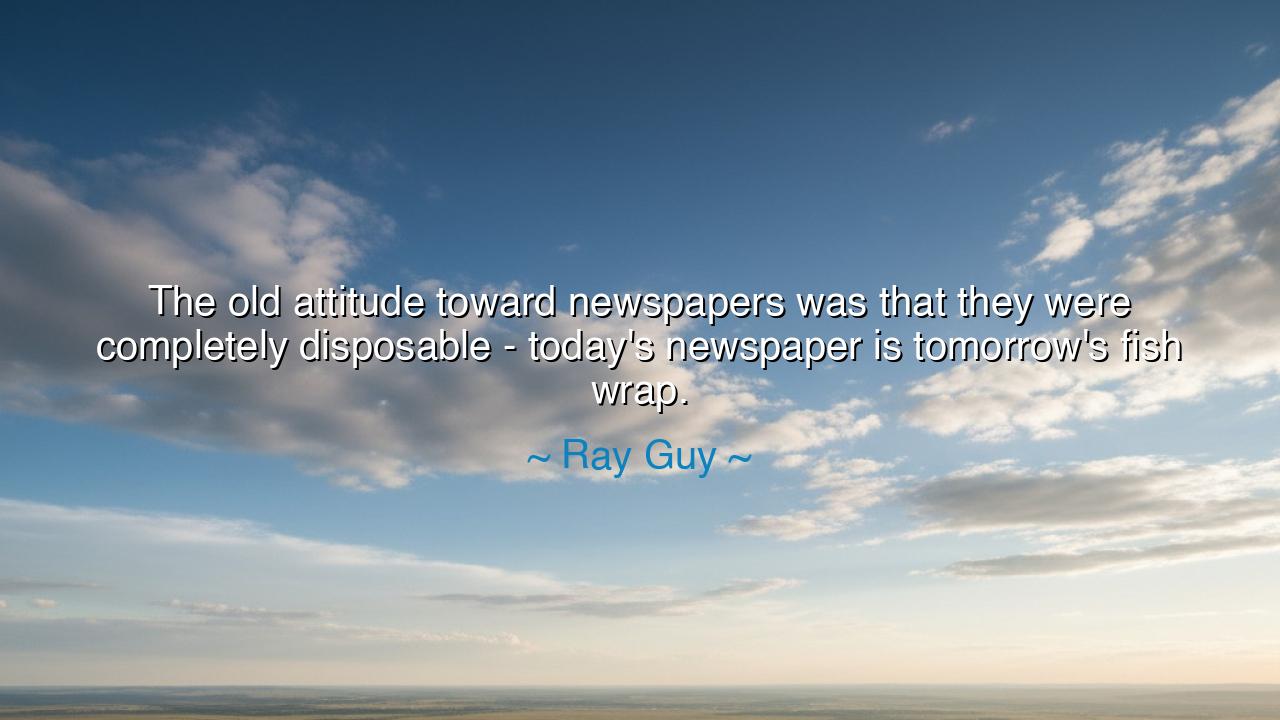
The old attitude toward newspapers was that they were completely
The old attitude toward newspapers was that they were completely disposable - today's newspaper is tomorrow's fish wrap.






Host: The room was quiet, the soft sound of the rain tapping against the windows. The glow of the desk lamp illuminated the stack of newspapers on the table, their edges curled slightly, the ink still fresh but fading. Outside, the world moved on, the rhythm of cars and people passing by, oblivious to the pages of stories sitting idle in the room.
Jack sat across from the table, a newspaper spread out in front of him, his eyes scanning the headlines, but his mind far from the words. Jeeny stood by the window, looking out at the wet world beyond, her arms folded across her chest, her expression contemplative.
Jeeny: (without turning from the window, her voice calm) “Ray Guy once said, ‘The old attitude toward newspapers was that they were completely disposable — today’s newspaper is tomorrow’s fish wrap.’”
(She glanced at Jack, her gaze thoughtful.) “Do you think that’s true? That newspapers have become disposable?”
Jack: (looking up from the paper, his voice dry) “It’s hard to argue with that. Think about it — you read it, you’re done with it, and then it’s just... waste. In a world where news cycles are 24/7, it feels like it’s all disposable.”
Jeeny: (nodding slowly) “Exactly. The speed at which information is consumed now is insane. The moment a paper is printed, it’s outdated. And then it’s replaced by something newer, faster, louder.”
Jack: (sighing, folding the paper in half) “I miss the way it used to feel — the weight of a morning paper, the way it felt to sit down with a cup of coffee and actually read it. The newspaper had a sense of permanence back then. You didn’t just read it and forget it.”
Jeeny: (walking toward the table, her voice gentle) “But the question is, can we still treat it the same way? In an age where information is so immediate, where does the newspaper fit in?”
Jack: (with a soft chuckle) “I think it’s trying to figure that out. It’s not just a collection of stories anymore. It’s an artifact in a world that doesn’t seem to value artifacts.”
Jeeny: (sitting down across from him, her expression softening) “And yet, there’s still something about holding a physical newspaper, right? Something about the ritual of reading it. It’s more than just the information; it’s the experience of it. The tactile feeling, the connection to the past.”
Jack: (nodding, a faint smile on his lips) “Yeah, I guess. It’s like a connection to a slower time, when news didn’t fly at you every second. It took a moment to digest, to sit with, to reflect on.”
Host: The rain outside began to pick up again, its rhythm now steady, almost soothing. The world seemed to have slowed, just for a moment, the chaos outside muffled by the quiet stillness of the room. The newspaper on the table sat there like a relic, its pages full of stories, of history, of moments that had already passed, waiting to be replaced by the next story, the next headline.
Jeeny: (her voice quieter now, almost a whisper) “Maybe that’s why we still keep them around — because they’re a bridge to something we’re losing. A connection to something permanent in a world that’s always changing.”
Jack: (his fingers tracing the edges of the paper) “Maybe. Or maybe we just miss the ritual of it. The way we used to sit with information, not consume it in a split second. There’s something that’s lost when everything moves so fast.”
Jeeny: (softly) “It’s the same with everything, isn’t it? The way we consume. The way we move through life. Everything is disposable now, faster, louder, but less meaningful.”
Jack: (pausing, looking down at the paper again) “Yeah. It’s like we’ve forgotten how to sit with things. To reflect. To give them the time they deserve.”
Host: The light in the room dimmed slightly as the day began to fade into night, the atmosphere heavy with the understanding that something had changed, something that couldn’t easily be returned. The newspaper on the table was still there, its stories waiting, but no longer holding the same weight they once had. The world outside continued its rapid pace, its constant hunger for more, faster, louder. But here, in the quiet room, the pause felt necessary, like the echo of a time when newspapers were more than just stories — they were part of the ritual of life.
Jack: (finally, with a small sigh) “I guess we all have to find a new way to honor what we lose in the process of progress.”
Jeeny: (nodding, her eyes distant now as she looked at the paper once more) “Maybe. Or maybe we just need to find a balance. A way to keep the ritual, the connection, without losing what makes us move forward.”
Host: The clock on the wall ticked softly, marking the passage of time, the slow movement from one moment to the next. Outside, the rain continued, steady and unhurried, a reminder that some things still moved at their own pace.
And in the quiet space between them, the truth of Ray Guy’s words lingered — that in a world where everything seems disposable, it’s the things we choose to slow down for that give us meaning.






AAdministratorAdministrator
Welcome, honored guests. Please leave a comment, we will respond soon